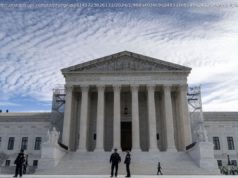The Attorney General’s Office counters that the confidential documents it improperly obtained on Sharon Carrillo have been destroyed and that its attorneys’ actions don’t warrant removal from the case.
Attorneys for Sharon Carrillo are arguing that the state’s highest court should disqualify individual prosecutors – or the entire Attorney General’s Office – from Carrillo’s case because they improperly obtained confidential documents about Carrillo, and if left uncorrected, the error could compromise her constitutional rights at trial.
The state, meanwhile, said it has already acknowledged the mistake, taken steps to mitigate any harmful effects, and surrendered all copies of the documents to the court or destroyed them, in line with orders from a judge who did not find the error serious enough to warrant disqualification.
The argument that the entire Attorney General’s Office should be excluded would fly in the face of constitutional and legal obligations the office has to prosecute homicides throughout most of Maine.
The briefs, submitted Thursday, come before June 12 oral arguments in the emergency appeal, which has triggered a pause in the ongoing criminal case against Carrillo, 33.
She is charged with the depraved indifference murder of her 10-year-old daughter, Marrissa Kennedy, who died in February.
Also charged in the death is Carrillo’s husband, Julio Carrillo, 51. Police allege that together, the couple brutally beat Kennedy for months until she succumbed to her injuries, and that the Carrillos plotted to play off the death as an accident.
At issue in the appeal are roughly 70 pages of confidential records that the Attorney General’s Office demanded from a school for children with learning disabilities that Carrillo attended as a child in Amenia, New York.
Sharon Carrillo’s attorney, Christopher MacLean, has advanced a theory that Carrillo was less culpable in her daughter’s death because she has intellectual disabilities that make her particularly susceptible to coercion and manipulation by her husband, who reportedly abused her physically and verbally.
Student records held by a school are confidential under federal law.
Following Carrillo’s arrest, the attorney general sent a subpoena to the head of the Maplebrook School, but according to court records, Assistant Attorney General Donald Macomber did not follow the required procedure of arguing before a judge why he wanted the records and what he thought they might show; the judge could then review the material privately before making a determination whether it should be turned over to attorneys.
That process would have also given Carrillo’s attorney a chance to object and be heard on the point.
But instead, the Attorney General’s Office sent the subpoena directly to the school, and the administrator there complied, turning over 72 pages of records that showed Carrillo’s grades, her individual education plan, and a psychological evaluation.
The confidential school records were reviewed briefly by the prosecutors and investigators before Carrillo’s attorneys intervened and a judge ordered that copies of the records be held by the court and that any digital copies be destroyed.
The Attorney General’s Office complied, and submitted affidavits describing how no one in their office or with the state police did an in-depth review of the records.
But Carrillo’s attorney insists in court records that their actions constituted prosecutorial misconduct, and that access to Carrillo’s psychological evaluation could provide the state with a road map to her psyche, giving them an unfair advantage if Carrillo chooses to testify at her trial.
But the state argues that information about Carrillo’s psychological state and cognitive abilities are not privileged, and that Carrillo’s attorney had discussed her mental limitations in prior court hearings and in the press.
The state also argued that the records would be turned over anyway if Carrillo is evaluated by a state mental health expert, who would likely include a review of the school information in any report filed about Carrillo.
A decision by a lower court judge found that the procedural error by Macomber did not warrant the extraordinary step of disqualifying his office from participating in the case.
The state has asked the high court to uphold that decision.
Send questions/comments to the editors.






